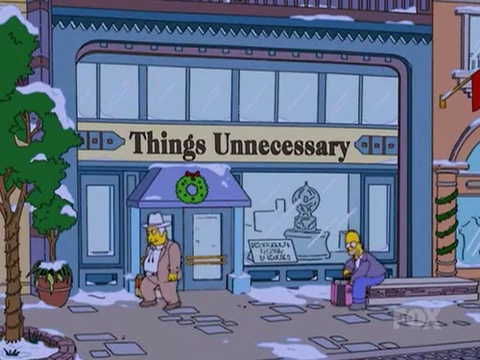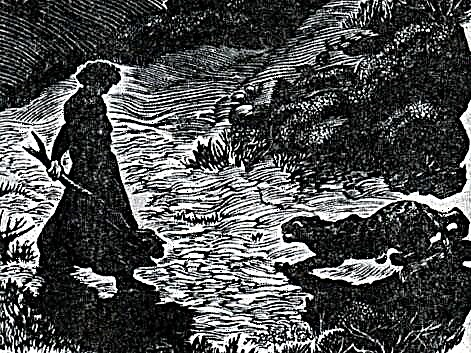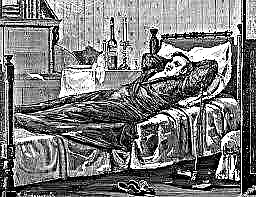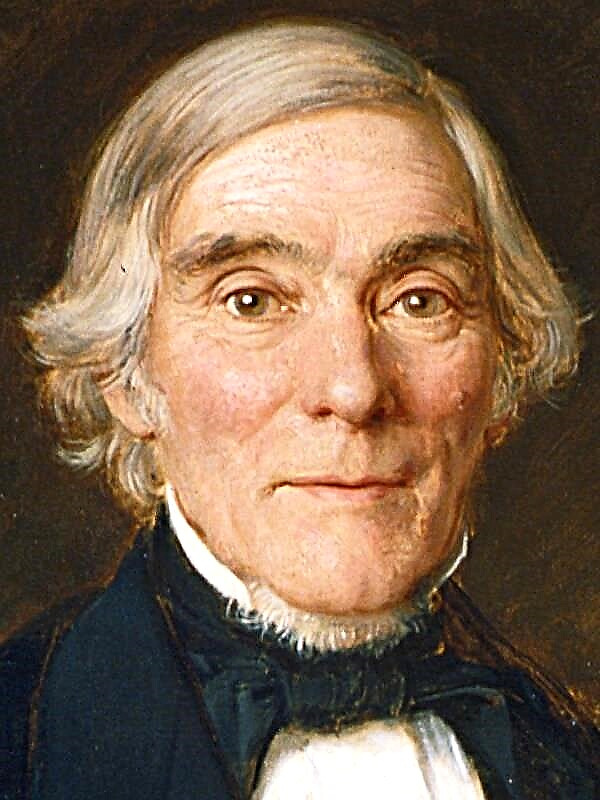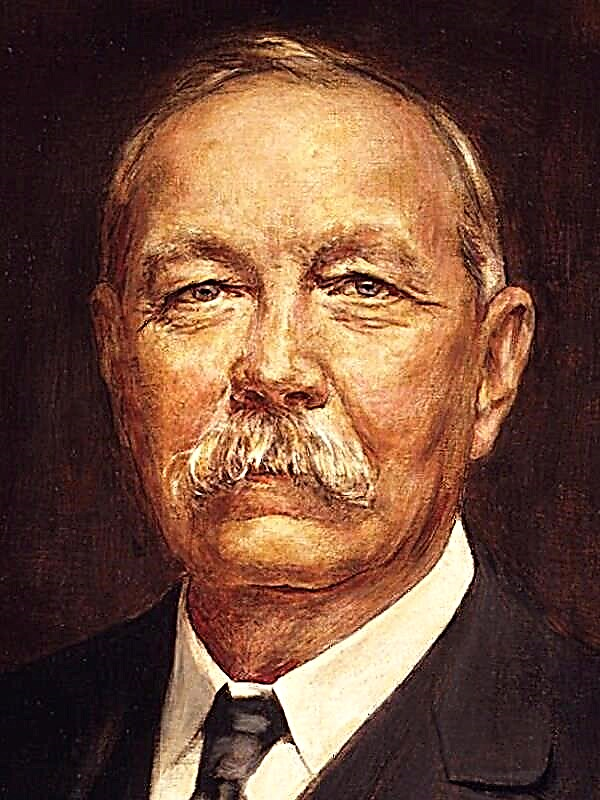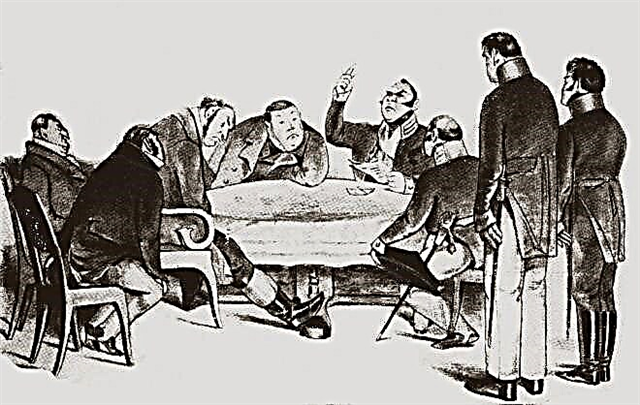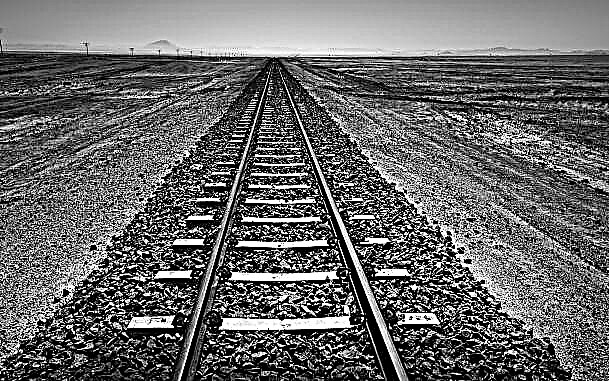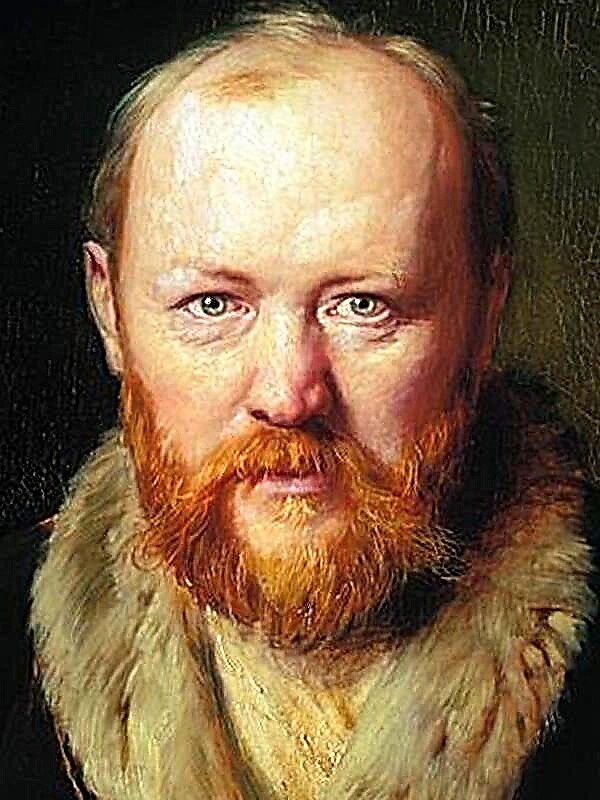The play takes place in three "forest cantons" - Schwyz, Uri and Unterwalden, which, united in 1291, formed the basis of the Swiss Union in the struggle against the Austrian rule of the Habsburgs.
It is hard for ordinary people suffering from the arbitrariness of the governors of the Austrian emperor - Fochts. The villager from Unterwalden, Baumgarten, the commandant of the fortress almost dishonored his wife. Baumgarten killed him, and he had to flee from Landshocht soldiers. In a storm with a risk to his life, daredevil William Tell helps him cross the lake. Thus, he avoids persecution.
In the canton of Schwyz, the peasant Werner Stauffacher is grieving. He is threatened by the governor of the region. He promises to deprive him of housing and households only because he did not like what wealth he lives in. Werner’s wife advises him to go to Uri, there will also be people there who are dissatisfied with the power of the Fogt strangers. Although she is a woman, she understands that in the struggle against a common enemy it is necessary to unite.
Arnold Melchtal of Unterwalden, hiding from the poem of Landenberg, is hiding in the house of a man respected in Uri by Werner Fürst. On the order of the governor, they wanted to take away a couple of oxen from him, resisting, he killed the Autrian soldier's finger and was forced, like a criminal, to flee his home. Then his father's eyes were gouged out for his son’s wrongdoing, everything was taken away, they gave a staff and were allowed to wander under the windows of people.
But the patience of the people is over. In the house of Werner Fürst, Melchtal, Stauffacher and the owner themselves agree on the beginning of joint action. Each of them will go to his villagers and discuss the state of affairs with them, and then ten reliable husbands from each canton will gather to work out a joint solution in the mountains, in the Ryutli glade, where the borders of the three cantons converge.
The sovereign baron of the local places of Attinghausen does not support the power of the Landshtows. He discourages his nephew Rudenz from joining the Austrian service. The old baron realizes that the true reason that prompted his nephew to make such a shameful decision is the love of wealthy Austrian heiress Berthe von Bruneck, but this is not a serious reason for a man to change his homeland. Confused by Uncle's insight, Rudenz finds no answer, but still leaves the castle.
The inhabitants of Schwyz, Unterwalden and Uri gather in the Rutli meadow. They make an alliance. Everyone understands that they can’t come to an agreement with the Austrian governors by peaceful means, therefore it is necessary to develop an accurate plan of military operations. First you need to capture the castles of Rosberg and Sarnen. It will be easy to get into Sarnen on Christmas, when, according to tradition, it is customary for fogt to give gifts from the villagers. In the fortress Rosberg will point the road Melchtal. He has a familiar servant there. When two castles are captured, lights will appear on the tops of the mountains - this will serve as a signal for the performance of the militia. Seeing that the people are armed, the Foghts will be forced to leave Switzerland. Peasants swear allegiance to the struggle for freedom and disperse.
William Tell, whose house is in the mountains, is still away from the main events taking place in the villages. He does household chores. Having repaired the gate, he gathers with one of his sons for his father-in-law, Walter Fürst, in Altorf. This is not like his wife Gedvig. There Gesler, the governor of the emperor, but he does not like them. In addition, Tell recently met Gesler by chance alone on a hunt and witnessed how he was frightened, "that shame will never be forgotten."
Tell's road leads him to the square in Althorf, where there is a hat on a pole, which, by order of Landsfoht Gesler, all those passing must bow. Not noticing her, an alpine shooter with his son pass by, but the soldiers on guard, detain him and because he did not honor the hat, they want to take him to prison. The villagers stand up for Tell, but Gesler appears with his retinue. Upon learning what was happening, he suggests that the Alpine shooter knock an apple off his son’s head with an arrow, or he and his son face death. The villagers and Walter Fürst, who approached, persuade Gesler to change his mind - the Landshochte is adamant. Then Tell's son - Walter - himself becomes, puts an apple on his head. William Tell shoots and knocks an apple. Everyone is moved, but Gesler asks the shooter why he took out two arrows before aiming. William frankly admits that if the first shot killed his son, the second arrow would pierce Gesler. Landfoht orders the arrest of Tell.
In a boat, the Landaucht together with the soldiers set off across the lake to deliver William Tell to the Kusnacht canton. The storm begins, the Voigth soldiers throw oars, then Gesler offers the arrow to control the boat. He is untied, but he brings the boat closer to the shore and jumps on the stones. Now, through the mountains, Tell is going to go to Kusnacht.
In his castle, Baron Attinghausen dies, around him settlers from three mountain cantons. They love their master, he has always been their reliable support. The old man says that he leaves this world with sorrow in his heart, because his peasants remain “orphans” without him, there will be no one to protect them from foreigners. Then ordinary people reveal to him the secret that they entered into an alliance of the three cantons on Rutli and will fight together against imperial tyranny. The Baron rejoices that his homeland will be free, only the indifference of the nobles to what is happening overshadows him, but he dies with the hope that the knights will swear allegiance to Switzerland. The baron’s nephew, Rudenz, runs in, he is late to the bed of the dying man, but over the body of the deceased he swears allegiance to his people. Rudenz reports that he is aware of the decision taken at Rutli, but the hour of the speech must be accelerated. Tell was the first victim of procrastination, and his bride, Bert von Bruneck, was kidnapped from him. He asks the peasants to help him find and release her.
Tell, in an ambush on a mountain trail leading to Kusnacht, awaits Gesler. In addition to him, there are still peasants who are hoping to get an answer to their petitions from Focht. Gesler appears, a woman rushes to him, praying for her husband to be released from prison, but Tell's arrow catches up with him, the landscape driver dies with the words: "This is Tell's shot." Everyone rejoices in the death of a tyrant.
Signal lights are lit on the tops of the mountains, the Uri people arm themselves and rush to ruin the Igo Uri fortress in Altdorf - a symbol of the power of the Austrian landfochts. Walter Fürst and Melchtal appears on the street, who says that at night, with a sudden attack, Ulrich Rudenz captured the castle of Sargen. He, with his detachment, as was planned, made his way to Rosberg, captured him and set fire to it. It turned out that in one of the rooms of the castle is Berta von Brunek. Rudenz, who arrived in time, threw himself into the fire, and as soon as he carried his bride out of the castle, the rafters collapsed. Melchtal himself overtook his abuser Landenberg, whose people blinded his father, he wanted to kill him, but his father begged to release the criminal. Now he is already far from here.
People celebrate victory, a hat on a pole becomes a symbol of freedom. A messenger appears with a letter from the widow of Emperor Albrecht, Elizabeth. The emperor was killed, his killers managed to escape. Elizabeth requests to extradite criminals, the main of which is the emperor’s own nephew, the Swabian duke John. But no one knows where he is.
In the house, Tella asks for a wandering monk. Recognizing the shooter in Tell who killed the imperial land-vault, the monk throws off his cassock. He is the nephew of the emperor, it was he who killed the emperor Albrecht. But contrary to John’s expectations, William is ready to drive him out of his house, because the “mercenary murder” for the throne cannot be compared with the “self-defense of his father.” However, good Tell is not able to push away an inconsolable person, and therefore, in response to all John's requests for help, he shows him the way through the mountains to Italy, to the Pope, who alone can help the criminal find a way to comfort.
The play ends with a public holiday. The villagers of the three cantons rejoice in freedom and thank Tell for getting rid of the landflight. Berta announces to Rudenza his consent to marry him, while on the occasion of the universal holiday he gives freedom to all his serfs.

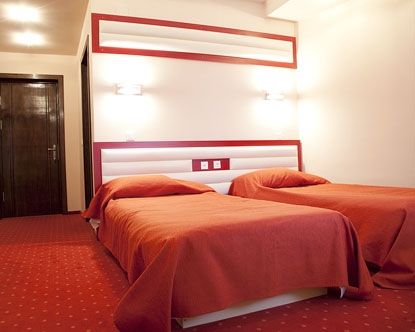
 Thinking traps
Thinking traps